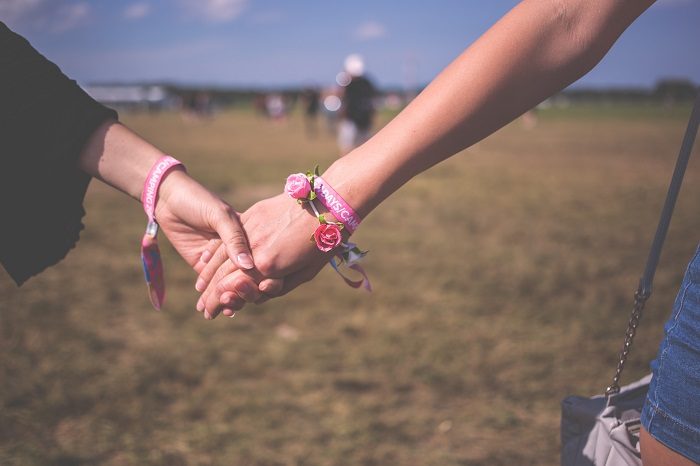As an “old soul,” I feel a deep connection with most of the people I meet these days, and often, that familiar feeling of having known new friends my whole life will emerge after just a few exchanges—and we’re just picking right back up where we left off.
I think it’s a testament to the ingrained romanticism of the human race that we’ve always had this mythos across cultures and history of some special one (or ones) who communes with you on all levels, who is your destined romantic partner for life, who you’re supposed to find and fuse with in order to reach your highest potential of happiness, success, or whatever.
I have a different perspective on this concept, based on my understanding of relationships and karma.
My understanding is that every single connection we have with another human being is an ongoing invitation to be and become soulmates—from the barista who makes our morning coffee, to our spouses of 30-plus years. There is no difference between the two, karmically speaking.
When we get fixated on particular people and attached and expectant to them playing specific roles based on our judgments and ideas about them, we continue to create and perpetuate this karma. We stop being present with what’s happening now, and we become trapped in our waking dream of who we think they’re supposed to be. And so, we treat them differently. But every person is each the same reflected light as us, and as our closest loved ones.
We have complete agency to choose the relationships that we have with one another, in every moment that we connect.
Sacred relationship is the creation of ongoing mutual agreements (or disagreements) that we make with one another: consciously, unconsciously, energetically, and emotionally. And those conversations (both mundane and magical) are doorways to love, connection, and belonging, which are the single greatest transformers of pain, trauma, and disconnection.
A lot of people (myself included) feel or have felt like they’re “destined” to have certain interactions with folks. You know, that whole story that you’ve made agreements or contracts with one another before you incarnated on this planet and now you’re “carrying out the agreement” when you meet on this earthly plane.
Even if that’s true, remember the adage that prior consent is not ongoing consent.
So, whether you agreed to a “soul contract” with someone 300 years ago or three days ago, you can always change your mind about how your relationship unfolds. Always—at any time.
When you view relationships through the “destined soul contract” lens, you’re disempowering yourself and refusing to take responsibility for your side of the street in the relationship. Nothing is “destined” or set in stone when it comes to our relationships. We have the agency to change them.
We’re here, now, doing this work together in the present moment. We can revoke or uncommit from any old contracts or patterns we feel are playing out with the people in our lives anytime we choose.
The question we might ask ourselves when we meet someone new isn’t, “Is this person my soulmate/twin flame/member of my soul family?”
A better question to continually ask ourselves is twofold: “What is this person teaching me right now, about myself and about themselves?” and, “How can I love myself and this other person as fully as possible right now while still attending to my own needs, boundaries, and autonomy?”
And that’s part of what really freaks me out about the “twin flame” superstition—the overarching belief that these relationships are supposed to be painful, hard, uncomfortable, and rife with conflict, and how that is supposedly the “sign” that we’ve found our “twin flame.”
Conflict is not abuse, but conflictual relationships that start off rocky can continue to be rocky and can also create a slippery slope into toxic and abusive behavior, simply because ongoing relationship conflict is stressful and even the most zen human being can buckle and revert to fight-or-flight unhealthy tactics in that atmosphere.
But please understand: I’m not condoning abuse or making excuses for it.
When we’re having a difficult time in relationship with someone and our buttons are constantly being mashed, it’s hard to always behave perfectly. And it’s also a sign that perhaps we might not be a good match for the other person. Some conflict is healthy and generative, but high-flying drama and ongoing conflict with lots of push and pull behavior is a sign that something is wrong. It’s possible that particular relationship is dis-regulating to both parties and is triggering old traumas to the point that we can’t behave like rational human beings.
The “twin flame” paradigm is dangerous because it normalizes this kind of dramatic, conflictual, painful exchange at the beginning of a relationship. And in that, it also potentially normalizes abusive behavior and the idea that pain and suffering in a relationship (especially at the beginning) is a good sign and an indicator that we’ve found “the one.” Instead, it could be an indicator that we’ve found a “big red flag.”
Relationships are complicated, and there’s a lot to unpack. But my biggest lessons and greatest connections have come from viewing even the most casual of interactions through the eyes of the other person being a divine beloved.
It’s incredible to witness what unfolds when we stop writing certain people off for whatever reason and instead move closer, get curious, ask questions, and focus on what we share with another person, rather than where we differ.
~







Read 2 comments and reply